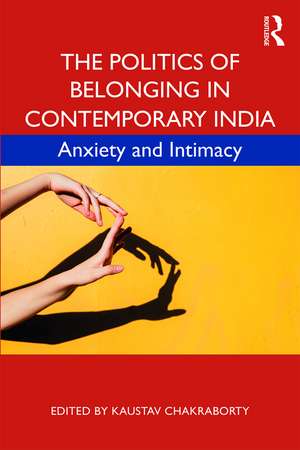The Politics of Belonging in Contemporary India: Anxiety and Intimacy
Editat de Kaustav Chakrabortyen Limba Engleză Paperback – 16 iul 2019
- Brings together themes of nationhood, motherhood, disability, masculinity, ethnicity, kinship, and sexuality, and attempts to understand them within a more complex web of issues related to space, social justice, marginality, and communication;
- Focuses on the struggles for intimacy by the disabled, queer, Dalit, and other subalterns, as well as people with non-human intimacies, to propose an alternative theory of the politics of belonging;
- Explores the role of social and new media in understanding and negotiating intimacies and anxieties.
| Toate formatele și edițiile | Preț | Express |
|---|---|---|
| Paperback (1) | 389.66 lei 6-8 săpt. | |
| Taylor & Francis – 16 iul 2019 | 389.66 lei 6-8 săpt. | |
| Hardback (1) | 1000.27 lei 6-8 săpt. | |
| Taylor & Francis – 15 iul 2019 | 1000.27 lei 6-8 săpt. |
Preț: 389.66 lei
Nou
Puncte Express: 584
Preț estimativ în valută:
74.56€ • 78.05$ • 62.06£
74.56€ • 78.05$ • 62.06£
Carte tipărită la comandă
Livrare economică 31 martie-14 aprilie
Preluare comenzi: 021 569.72.76
Specificații
ISBN-13: 9780367273071
ISBN-10: 0367273071
Pagini: 276
Dimensiuni: 156 x 234 x 18 mm
Greutate: 0.45 kg
Ediția:1
Editura: Taylor & Francis
Colecția Routledge India
Locul publicării:Oxford, United Kingdom
ISBN-10: 0367273071
Pagini: 276
Dimensiuni: 156 x 234 x 18 mm
Greutate: 0.45 kg
Ediția:1
Editura: Taylor & Francis
Colecția Routledge India
Locul publicării:Oxford, United Kingdom
Public țintă
PostgraduateCuprins
Introduction: the politics of belonging: anxiety and intimacy Part I: Intimacy, marginality, and anxiety
1. Identification, belonging, and the category of Dalit 2. Emotions in the context of caste slavery: exploring the missionary writings on Kerala 3. Nature and belonging: distance, development, and intimacy Part II: Rethinking intimacy, contemporarity vis-à-vis the conventional institutions 4. Intimacy in Tamil kinship 5. Reading queerness: same-sex marriages in India 6. Homes as conversions: literalising the metaphor of Ghar Wapsi Part III: Dissident body and belonging 7. Anti-caste communitas and outcaste experience: space, body, displacement, and writing 8. Disability and intimacy in the making of Madurai Veeran Part IV: Space, vigilance, and getting intimate 9. The modern-day sex worker: the intimate ‘Other’ of intimacy and belonging 10. Public spaces and private intimacies: the ‘Politics of Belonging’ in parks 11. Queer intimacies in the time of new media: when Grindr produces alternative cartographies Part V: Textual belongings 12. Intimacy, belonging, and masculinity in Bhalachandra Nemade’s novel Kosla (Cocoon) 13. Hesitant intimacy: North East Indian English poetry vis-à-vis the Indian nationhood Part VI: Techno intimacies 14. Maternal intimacies online: how Indian mom bloggers reconfigure self, body, family, and community 15. Routing techno intimacy, risk, anxiety, and the ambient political
1. Identification, belonging, and the category of Dalit 2. Emotions in the context of caste slavery: exploring the missionary writings on Kerala 3. Nature and belonging: distance, development, and intimacy Part II: Rethinking intimacy, contemporarity vis-à-vis the conventional institutions 4. Intimacy in Tamil kinship 5. Reading queerness: same-sex marriages in India 6. Homes as conversions: literalising the metaphor of Ghar Wapsi Part III: Dissident body and belonging 7. Anti-caste communitas and outcaste experience: space, body, displacement, and writing 8. Disability and intimacy in the making of Madurai Veeran Part IV: Space, vigilance, and getting intimate 9. The modern-day sex worker: the intimate ‘Other’ of intimacy and belonging 10. Public spaces and private intimacies: the ‘Politics of Belonging’ in parks 11. Queer intimacies in the time of new media: when Grindr produces alternative cartographies Part V: Textual belongings 12. Intimacy, belonging, and masculinity in Bhalachandra Nemade’s novel Kosla (Cocoon) 13. Hesitant intimacy: North East Indian English poetry vis-à-vis the Indian nationhood Part VI: Techno intimacies 14. Maternal intimacies online: how Indian mom bloggers reconfigure self, body, family, and community 15. Routing techno intimacy, risk, anxiety, and the ambient political
Notă biografică
Kaustav Chakraborty is Assistant Professor at the Department of English, Southfield (formerly Loreto) College, Darjeeling, India. He was formerly a fellow at the Indian Institute of Advanced Study, India. Dr Chakraborty has edited Indian Drama in English, Tagore and Nationalism (co-edited with K.L. Tuteja), and is the author of Indigeneity, Tales and Alternatives: Revisiting Select Tribal Folktales. In addition, he has published articles in journals such as Feminist Theology, Studies in Humanities and Social Sciences, and many other reputed journals. His research interests include indigenous literature and culture, queer theory, and cultural studies.
Descriere
This volume looks at the emerging forms of intimacies in contemporary India. Drawing on rigorous academic research and pop culture phenomenon, the book will be useful to scholars and researchers of political studies, sociology, sexuality and gender studies, women studies, cultural studies, and minority studies.
